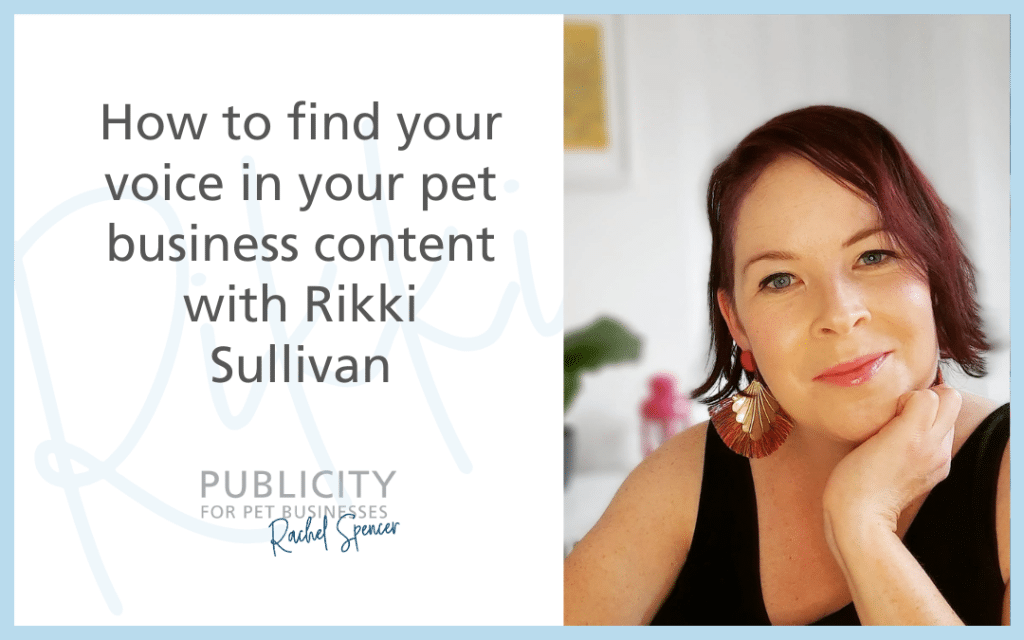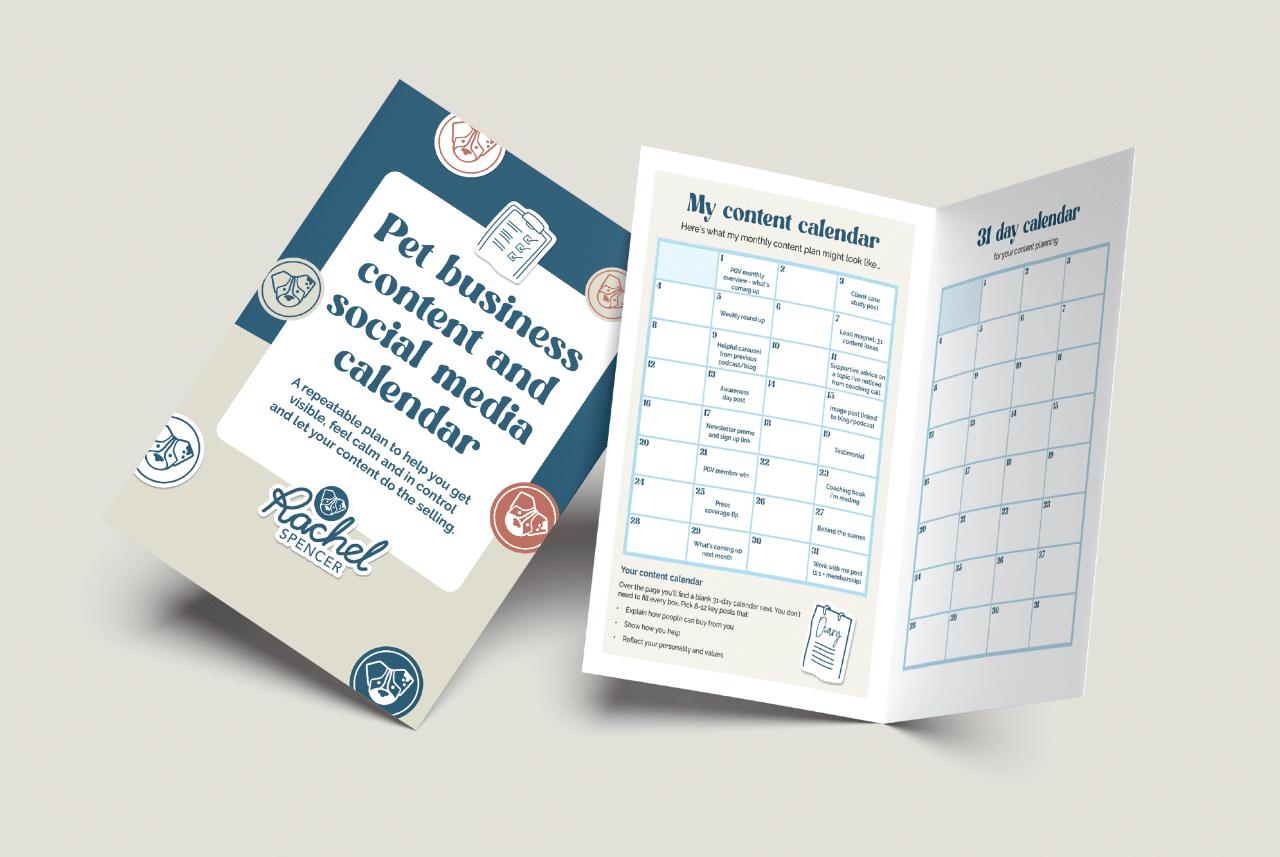When it comes to creating content for your pet business, how do you feel?
Do you worry about how you come across? Too formal? Too informal? Too stuffy or professional?
It’s important to make the right impression with clients and prospective customers and make them feel that what we provide is right for them.
Words are so powerful. In today’s climate we all have the attention spans of distracted Spaniels.
So how do you stand out? Well your words can help make a start.
In this podcast Rikki Sullivan from the Canine Copywriter shares her advice on finding your voice.
You can listen in on the player link below or continue reading as a blog post.
If you’d like to learn more about blogging, you might enjoy How to start a pet blog or pet business blog or come and learn how we can work on this in my Pets Get Visible Membership,
What does finding your voice mean in relation to your pet business?
Finding your voice is about the type of language you use and the tone you use in your communications. Consider how you want to make them feel? This will be reflected in the way you talk to your customers, both verbally and in your copy. The voice you give to your business should be consistent and match the type of clients you are seeking. Rikki explains: “If you want to attract middle aged dog owners for example then you don’t want to be using a lot of slang and youthful references. “If you’re targeting the younger generation then you may want to be a little more hip in your approach. “To win clients, and ultimately trust, we want our clients and prospective clients to feel an affinity to us. “This means using language they can identify with and understand. We want to be relatable. “People buy from people and want to get a feel for the person or people behind a business.”Why does your voice matter when it comes to writing about your pet business?
Your voice and your personality can help you stand out, and can help clients differentiate you from the rest. Rikki says: “If someone feels they know you a little, and they like you, they’re more likely to buy from you than the bland alternative who just presents a product. “Your personality is a big part of your brand, and if you can inject that into your copy and communications then you will stand a better chance of connecting with your audience.”Where do you get started with finding your voice?
A good way to begin exploring this is to think about the values you want to communicate and how you want your clients to feel about you. “I like to think about it in terms of what personality your business has, or you would like it to have,” Rikki explains. “For example, if you have a Canicross business you may want to come across as energetic, knowledgeable, and approachable. “A person running a business like this is likely to be energetic, into the science behind it, and keen to make it accessible to all. “So it’s likely the best voice for your business, is in fact, your own!”How do you find out how you sound?
Keep it simple – just ask friends! What words would they use to describe your communication style? Are you quite formal, or more relaxed in your tone. Are you direct or soft in your communications? Do you tend to provide a lot of detail or are you straight to the point. Rikki adds: “Another great way is to ask existing customers how they perceive you. “If you feel comfortable asking then see what words they think of when prompted to think about your pet business. “Look back at your social media posts and try to be objective. “If you were a new person looking at this content, what would you think and feel about the person or business behind them?”How do you translate this into words?
Rikki says she’s a fan of writing in quite a conversational tone as it matches her personality meaning it’s easy to keep consistent. She says: “If your brand voice is a reflection of you, then simply writing as you talk can be a great starting point – taking out the umms and errs! “Think about who you’re talking to. “If you’re serving professionals within your industry then you can afford to use a bit more jargon perhaps than someone selling products or services to pet owners.”How can you build confidence in your writing?
Just do it! You will only get more comfortable doing something by trying. And the more you do it, the easier it becomes. Rikki suggests something called stream of consciousness writing. She explains: “This is literally putting pen to paper and letting everything in your head spill onto the page. “Now you may do this for journaling, to get all your ideas onto paper before organising them, or just to make writing a habit. “What’s so brilliant is it removes a lot of the barriers that put people off writing. You ignore spelling, punctuation, the end goal, and you just write. “You can find the joy in writing and it’s also a great way to empty your head.”What if you don’t feel knowledgable enough to write about your pet business?
Rikki says this is a common question from clients who don’t feel experienced enough to write and share their viewpoints. Her advice is to simply share what you do know. “We all have experience of something,” she says. “This is age old advice for writers and it’s good advice! “If you’re writing about something you are passionate about or know well then that will shine through, and your confidence will grow. “And if you feel that you need a bit of factual evidence or the voice of an expert then research and approach one.” For more tips on collaboration, you might like to read: Seven ways collaborations can help your pet businessWhat to do if you really feel you can’t write your own content?
If you know you need to create content, but you’re struggling, then get some help. Rikki says: “Whether you’re too busy to write, don’t have any ideas, or have no idea where to start, there are things that can help. “There are a ton of free resources online; great podcasts and blogs that can help you learn or you can take a course. “Or, of course, you can hire a copywriter. You give them a brief of what you want your content to cover. “They write it for you, in your voice, known as ghost writing, and you upload it onto your website. “This can be a way of keeping consistent with your content, without the added workload and overwhelm.” Rikki provides content for pet business owners and is an experienced pet professional. To find out more, visit www.thecaninecopywriter.co.ukIf you’d like to learn more about blogging, you might enjoy How to start a pet blog or pet business blog or come and learn how we can work on this in my Pets Get Visible Membership,





